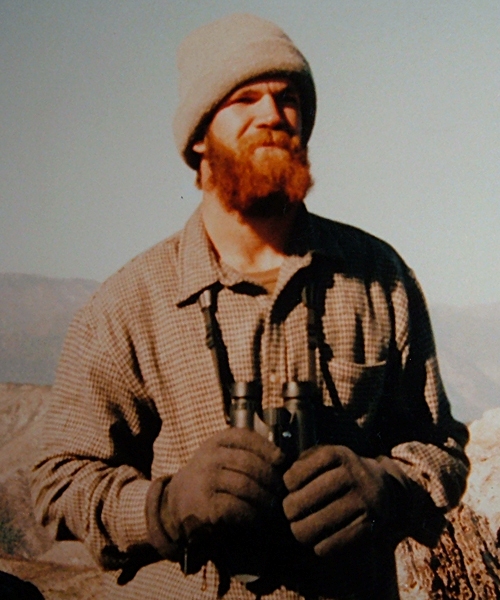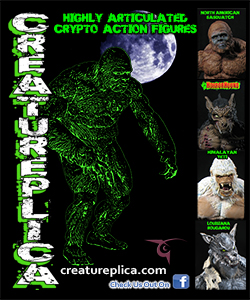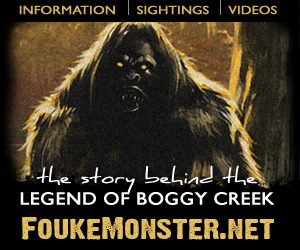Men in Cryptozoology: Blake Mathys
Posted by: Loren Coleman on June 22nd, 2007

Blake Mathys was born in Ohio on May 31, 1980.
On June 17th of that same year, a local Ohio farmer saw a hairy creature at the end of a field. The next day, 17 inches-long footprints were found in a wet area in the woods near where the creature had been standing. Blake’s uncle, Donald Mathys, made a plaster cast of one of those footprints.
Blake grew up hearing the stories of that birthyear incident. He also would look often through a scrapbook of newspaper clippings about the sightings and footprint discoveries, which occurred around Logan and Union Counties during the summer of 1980.
When Blake Mathys was about 12 years old, he became more interested and read a copy of René Dahinden’s and Don Hunter’s Sasquatch book. The book inspired Blake, and he began reading more books on the subject.
In the Mathys family scrapbook there is a newspaper clipping from the late 1980s, concerning Bigfoot researchers in Ohio. One of the people listed was Mike Claar, from Vinton County. One night when Blake was a teenager, Blake’s uncle called Claar. They all engaged in an hour long conversation. Blake and Donald Mathys arranged to go meet Mike Claar at his home in Vinton County. Claar told the Mathyses about sightings in the area (including Claar’s own), and showed them where things had happened.
Blake, with his uncle Donald Mathys, visited Vinton County regularly for a few summers, camping and hiking for days at a time. The Mathyses never found any evidence, but they explored and were impressed by the amount of forest in that area.
In about 1995, Blake called Rene Dahinden and had a good conversation, stimulating him to know that he has to keep reaching out to make more and more contacts in the field.
Eventually, the Mathyses learned about a Bigfoot conference being held in Newcomerstown, Ohio. They attended and Blake was surprised to discover a room full of Bigfoot enthusiasts. Blake and his uncle soon became regular attendees of the monthly meetings. They also would camp and hike for the weekend, going to the meeting on Saturday night. Blake Mathys enjoyed attending the meetings, learned much about the Ohio-Pennsylvania appearances of Bigfoot, and met many researchers, both locally and nationally.
During the period of 1996 to 2000, Blake was obtaining and reading as many Bigfoot books and some on cryptozoology, as he learned more and more. It was also during this time that Blake re-interviewed eyewitnesses, including Patrick Poling, the farmer who had originally sighted the creature in 1980.
In 1998, Blake began doing research with Chuck Storrie and Linda Wygle. They worked in areas of eastern and southeastern Ohio, and it was on these excursions that Blake first heard noises that may have been Bigfoot-related, although he never saw the creatures that made the sounds. Nevertheless, on two separate occasions he heard sounds that he couldn’t identify.
In 2001, Blake and his uncle travelled to the International Sasquatch Symposium in Bellingham, Washington. They were able to meet many of the Western researchers, and finally got to see some of the habitat available in Washington and British Columbia.
Instead of doing much field research in the last few years, Blake Mathys is currently working on his doctorate, a Ph.D. in Ecology and Evolution. He declares it “will provide me with the tools and knowledge to be a better cryptozoologist. My main research area is birds, but many of the same ecological considerations apply to mammals.”
Blake feels he will always be interested in Bigfoot. He tries to stay up-to-date on happenings in the field, and occasionally writes thoughtful contributions to stimulate discussion concerning his philosophy of Bigfoot research (e.g. “Six Rules of Bigfoot Research”).
Blake Mathys envisions his organizing an intensive Ohio Bigfoot research group someday, although he doubts that the necessary funding will be found to push it to the level it needs to be. Until then, he say, he is “more than happy to continue occasionally investigating eyewitness reports, essentially with the aim of seeing one of these creatures with my own eyes.”
BTW, yes, the Mystery Man Photo Quiz was a photograph of Blake Mathys with a little seasoning and short a few days of civilization in the wilds of Washington State.

About Loren Coleman
Loren Coleman is one of the world’s leading cryptozoologists, some say “the” leading living cryptozoologist. Certainly, he is acknowledged as the current living American researcher and writer who has most popularized cryptozoology in the late 20th and early 21st centuries.
Starting his fieldwork and investigations in 1960, after traveling and trekking extensively in pursuit of cryptozoological mysteries, Coleman began writing to share his experiences in 1969. An honorary member of Ivan T. Sanderson’s Society for the Investigation of the Unexplained in the 1970s, Coleman has been bestowed with similar honorary memberships of the North Idaho College Cryptozoology Club in 1983, and in subsequent years, that of the British Columbia Scientific Cryptozoology Club, CryptoSafari International, and other international organizations. He was also a Life Member and Benefactor of the International Society of Cryptozoology (now-defunct).
Loren Coleman’s daily blog, as a member of the Cryptomundo Team, served as an ongoing avenue of communication for the ever-growing body of cryptozoo news from 2005 through 2013. He returned as an infrequent contributor beginning Halloween week of 2015.
Coleman is the founder in 2003, and current director of the International Cryptozoology Museum in Portland, Maine.










Keep it up, Blake. Go Buckeyes!
Well, all I can say is this.
Anyone who drives around in a Jeep with “Blake Mathys Bigfoot Research” on the side must be using the Six Rules for good, instead of evil.
If he keeps an open mind, and it seems he would, ‘sall good.
Finally! The truth is revealed!
hey loren great article about ohio sasquatch researcher blake mathys. thanks bill green.
Six Rules of Mystery Man Research:
1. Rumors that it lives in Japan should never be taken at face value.
2. A first name beginning with “B” is NOT a hint.
3. Expect a name that is spelled in an unconventional manner.
4. Coat is variable; accept no account as definitive.
5. Compare photos. Lighting, angle, witness veracity and all the usual cryptid stuff need to be taken into account.
6. THERE ARE NO ‘CAVES’. I just had to toss that in there.
DWA- Good set of rules!